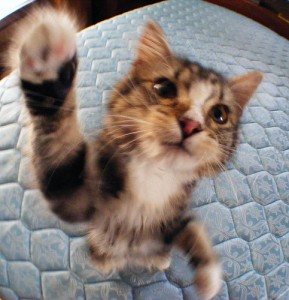Homophones are, quite simply, the bane of many editors’ existence. They’re one of the most common mistakes, and they’re easy to miss, because the brain is an unreliable monster.

“Is it affect or effect? I don’t know what to believe in anymore.”
Homophones are words that sound alike and may or may not be spelled the same. If they’re spelled the same, then great! You can screw it up all you want and no one will know the difference. It’s when words sound the same but they’re spelled differently that people start to look a little bit foolish.
Wikipedia warns not to confuse the word “homophone” with “homophobe” because Wikipedia is targeted at knuckleheads. Although, if you have fat fingers (or paws), you could very well accidentally type the wrong word, which is just another argument for proofreading.

Student Cat just received a poor grade from his professor due to “homophobe errors.”
Homophone errors can cause quite a bit of confusion in your writing (or just make you look like an idiot—either way).
Example: The cat killed the vampire with a steak to the heart.

“It’s so crazy, it just might work.”
Unless the vampire has some serious plaque build up in his arteries, this is probably the worst plan for defeating a vampire. Try again.
Example: The cat killed the vampire with a stake to his heart.
That makes much more sense, well, beside the whole scenario taking place to begin with.
One of the main problems with homophones occurs when people don’t know there are homophones to be had. Whenever someone runs into a homophone he or she never knew existed, there tends to be this horrifying moment:

“Wait. Have I been spelling it wrong this whole time?”
We’ve all felt that, so let’s work together to keep that from happening to anyone ever again. It’s time for some of the homophones to come out of the closet!
Altar (n)/alter (v)
The woman placed the cat upon the altar of her shrine.

The psychopath altered the bear’s skin so that he could wear it.

Bazaar (n)/Bizarre (adj)
Scruffy had spent his whole kittenhood selling silk scarves at the bazaar, and no one could haggle better than him.

“Psh! I can’t feed my litter on that offer!”
When Spot saw a cat selling scarves, he wagged his tail and said, “How bizarre!”

So judgmental.
Berth (n, sometimes v)/Birth (n, v, adj)
This one could be tricky if you’re high on catnip or something. The most common confusion with these homophones is when people talk about playoffs of any sort.

“I’ve worked too hard for you to ruin this moment with a homophone error.”
One does not earn one’s right to being birthed into playoff existence, though I can visualize the metaphor (all too vividly). Instead, one wins a playoff berth. So what’s the difference?
Berth has a few definitions. Most of them are nautical. When it comes to “berth” as a verb, all the definitions are about ships. So let’s move on. Here are the most useful, non-nautical definitions of berth as a noun, according to the gospel of Merriam-Webster.
1. “An amount of distance maintained for safety.”
Example. You’re going to want to give this cat a wide berth.

2. “Job, position, place.”
Example: This year the Jacksonville Jaguars will have their first playoff berth since 2007.

“What’s the point? It’s not like we have a chance at the Super Bowl anyway,” said the mopey jaguar.
As far as uses for “birth” go, I really hope I don’t have to provide explanation and pictures. Your parents/school districts should have already informed you about that process.

“But what about those nautical terms? Some of us might want to know!”
Fine. You’re asking for it. I’m not kidding about there being a lot of them.
1. Sufficient distance for maneuvering a ship
2. The place where a ship lies when at anchor or at a wharf
3. A place to sit or sleep especially on a ship or vehicle
4. A billet on a ship
And the verb:
5. To bring (a ship) into a place where it can stop and stay : to bring (a ship) into a berth
Complement (v, n)/Compliment (v, n)
Both of these have a positive connotation, so sometimes they’re confused. But trust me, the cat sweater doesn’t “compliment” the sad model’s beard, it “complements” it.
Example of it “complimenting” his beard: “Oh hey,” said the cat sweater, “your beard is awesome and it hides your sadness really well.”
Visual example of a cat sweater “complementing” his beard:

Just like the old saying goes, “They go together like a cat sweater and a bearded man.”
“Complement” means, “something that completes something else or makes it better,” as is clearly demonstrated by Vince (probably his name) and his amazing sweater, neither of which would be complete without the other. Can’t you see how complete he feels?
Discreet (adj)/Discrete (adj)
This one is a sneaky homo because most people only know one version of the word even exists, and that’s “discreet.” That version means that something is either out of the way or unlikely to be noticed, or it can refer to a person using good judgement or “being discreet.”

So very discreet.
“Discrete” is almost never used (except in Grammar Cat conclusion paragraphs), because it’s almost an exact synonym for “distinct,” so people tend toward that word instead. But “discrete” exists, it’s just being very discreet about its existence.
Hangar (n)/Hanger (n)
This cat is hanging out in some hangers.

This cat is hanging out in a hangar.

For those who still don’t get it, note the plane in the background.
Load (n, v)/Lode (n)
If you’re putting something into or onto something else, you are loading. The only word from this homo pair that can be used as a verb is “load.” Simple enough?
Okay, so here’s the thing. You can have a truckload of kittens…

… and you can have the mother lode of cat toys.

But while they appear very similar (they both have a large amount of something!), you cannot have a trucklode of kittens or a mother load of cat toys. The trick lies in the origin of the word “lode.” It originally referred only to an ore deposit, and the term “mother lode” referred to a particularly large one (that you might be killed for later if you didn’t keep your big mouth shut). Now we use it in reference to anything that we discover a lot of: “I found the mother lode of Fancy Feast at PetSmart today!” A good rule is that if you’re not referring to gold, and you don’t have the word “mother” in front of it, stick with “load.”
Mantle (n, v)/Mantel (n)
This cat is sitting on a mantel:

Mantel = pointless shelf above the fireplace
This cat is wearing a mantle:

Mantle = badass cloak
Two other definitions for the -le version:
1. “The position of someone who has responsibility or authority.”
Example: Fluffy had earned his mantle by defeating the mutt next door.
2. “The part of the interior of a terrestrial planet and especially the earth that lies beneath the crust and above the central core.”
Example: Tiger was terrible at geology; he always mixed up the central core and the mantle on his charts.
Stationery (n)/Stationary (adj)
“Stationery” is a thing. “Stationary” describes a thing. So yes, you can have stationary stationery, but not the other way around.
This cat is not moving. She is…

STATIONARY!
This cat is writing a letter on…

STATIONERY!
I hope we’ve taken a strong first step in outing some homophones. Keep in mind, there are hundreds, possibly thousands (depending on dialects) of homophones in English, so we’ve only touched on a few. Can you think of a homophone pair that needs to be outed? Let us know by requesting a topic, and it might just be our next PSA.
So next time you’re typing a word and you have this sneaking suspicion that there may be more than one way to spell it, perhaps you have actually stumbled upon a homophone! When that happens, be respectful and remember that homophones are actually discrete (boom!) words, not simply interchangeable spellings for the same thing. Let’s treat all homos with the respect they deserve.































